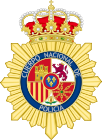- National Police Corps of Spain
-
National Police Corps
Cuerpo Nacional de PolicíaCommon name Policía Nacional Abbreviation CNP Logo of the National Police Corps. Badge of the National Police Corps. Motto Ley y Orden Law and Order Agency overview Formed March 13, 1986 Preceding agencies - Cuerpo Superior de Policía
- Policía Nacional
Legal personality Governmental: Government agency Jurisdictional structure National agency
(Operations jurisdiction)Spain Population 46,661,950 Legal jurisdiction As per operations jurisdiction. Governing body Government of Spain Constituting instruments - Spanish Constitution of 1978
- Organic Act 2/1986
General nature Operational structure Overviewed by Directorate-General of the Police and the Civil Guard Headquarters Madrid, Spain Officers 87.872 Minister responsible Antonio Camacho Vizcaino, Minister of the Interior Agency executive Francisco Javier Velázquez, Director-General Notables Anniversary - October 2
Award - Order of Police Merit
Website http://www.policia.es The National Police Corps (Spanish: Cuerpo Nacional de Policía, CNP; [ˈkwerpo naθjoˈnal de poliˈθi.a]) is the national civilian police force of Spain. The CNP is mainly responsible for policing urban areas, whilst countryside policing is generally the responsibility of the Guardia Civil, the Spanish gendarmerie. The CNP operates under the authority of Spain's Ministry of the Interior. They mostly handle criminal, judicial, terrorism and immigration matters. However, the CNP has limited competency in the Basque Country and Catalonia, where the autonomous Ertzaintza and Mossos d'Esquadra handle most matters except the most important ones like terrorism and organized crime.
Contents
Duties
Duties are regulated by the Organic law 2/1986 of March 13, 1986.
- The issuing of identity documents - ID cards and passports.
- To control receipts and outgoings of the foreign people and Spaniards.
- Immigration law, refuge and asylum, extradition and expulsion.
- Gaming enforcement
- Drug enforcement
- Collaborattion with Interpol and Europol.
- Control of private security companies
- General law enforcement
Access and training
Requirements
- Born or naturalized Spanish
- Between 18 and 30 years old
- At least 1.65 metres (5 ft 5 in) tall, for men, and 1.60 metres (5 ft 3 in) metres for women
- Not to have been convicted of fraud or dismissed by the state, autonomous or local governments, or prevented from holding public functions.
- Hold a driving licence of the class specified by the government.
Basic Scale:
- Have or to be in conditions to obtain the Certificate in Secondary Education or equivalent level. (Baccalaureate will be necessary in some years).
Executive Scale:
- Have a Technical Engineer, Technical Architect, Qualified University student or equivalent or top formation degree.
Competitive examination
The applicant can choose between a Basic Scale career or an Executive Scale career. Applicants must pass the following basic tests before starting the academy:
- Physical test
- Multiple-choice exam
- Aptitude test
- Volunteer language test (English or French)
- Medical examination
- Interview
Training academy
If the applicant has been chosen, they will receive professional training in Ávila's police academy for six months. Whilst trainees reside at the academy, they learn about Spanish law, receive firearms and self-defense training, conduct practical application exercises, learn the basics of the English language and undergo training in crime investigation. After that, the applicant will have the aula práctica, that mixes theoretical knowledge with practical situations for three months. Finally, the pupil will receive a policing practice, in which there will be various common situations that will form him as an agent.
Ranks
Pay scale Superior Executive Deputy Inspector Basic 






Comisario Principal Comisario Inspector Jefe Inspector Subinspector Oficial Agente English equivalent Commissioner Superintendent Chief Inspector Inspector Deputy Inspector Sergeant Officer Specialist units
There are numerous specialist units:
- GEO (Grupo Especial de Operaciones) - Special operations tactical unit, equivalent to GSG-9 or FBI HRT.
- GOES (Grupos Operativos Especiales de Seguridad) - Equivalent to SWAT units.
- SCDE-NRBQ (Servicio Central de Desactivación de Explosivos y Nuclear, Radiológico, Bacteriológico y Químico) - Explosive artifacts defuser and CRBN (Chemical, Radiological, Biological, and Nuclear) specialised team.
- UIP (Unidad de Intervención Policial) - Anti-riot unit.
- UDYCO (Unidad de Drogas Y Crimen Organizado) - Drugs and organised crime investigation squad.
- UDEV (Unidad de Delincuencia Especializada y Violenta) - Investigation and pursuit several kinds of crimes related to artistic and cultural heritage, families.
- BIT (Brigada de Investigación Tecnológica) - Computing crimes investigation.
- UCDEF (Unidad Central de Delincuencia Económica y Fiscal) - Monetary crimes.
- Guías Caninos - Canine unit. Drug, explosives and people detection.
Nicknames
An earlier uniform was brown, leading to the nickname la madera/los maderos ("the wood"/"the logs"). They are also called la pasma. Among supporters of the violent Basque terrorist organization ETA, Policía Nacional are colloquially referred to as txakurrak (Basque for "the dogs").
Gallery
Eurocopter EC120VAMTACSee also
External links
- Official website
- Spanish police forces forum The most complete forum about different Spanish police forces.
National Regional Basque Country: Ertzaintza · Canary Islands: Policía Canaria · Catalonia: Mossos d'Esquadra · Navarre: Policía Foral/ForuzaingoaLocal Categories:- National law enforcement agencies of Spain
- Spanish intelligence agencies
Wikimedia Foundation. 2010.






